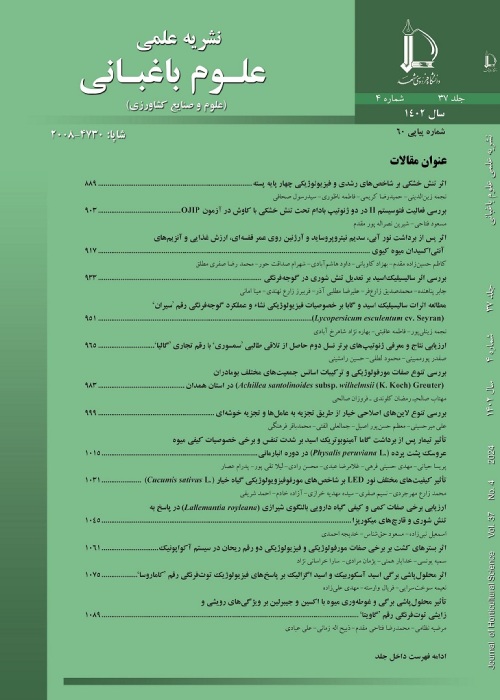Evaluation of the Effect of Biochar Obtained from Different Pyrolysis Temperatures on the Marigold Growth under Salt Stress
Biochar is a carbonaceous substance obtained from heating plant residues and wastes in an oxygen-containing medium with or without oxygen. Thermal decomposition of biomass in an oxygen-free medium is called thermophilicity (pyrolysis). Temperature is one of the factors influencing the characteristics of biochar. One of the objectives of this experiment is to investigate the effect of different temperatures on the biochar characteristics of cattle manure. The use of biochar as a soil conditioner and source of organic carbon in agricultural soils with minimal environmental damage is considered. Marigold is an annual plant that is used in industry and pharmacy in addition to food. Another aim of this experiment is to investigate the effect of biochar use from different temperatures on marigold under salinity stress.
For biochar preparation, after collecting cattle manure from Bardsir farms, air drying and sieving were used for pyrolysis process for four hours at different temperatures (300, 400, 500, 600 °C). Then pH, EC, carbon stability, ash and biochar performance were measured. In order to evaluate the effects of biochar resulting from different heat-treated temperatures on salinity tolerance of marigold, a factorial experiment was conducted in a completely randomized design in the greenhouse. The two factors studied included salinity levels (0, 4, 8 and 12 dS.m-1) and biochar resulting from different thermocouple temperatures (0, 300, 400, 500 and 600 °C). The biochar rate was considered to be 20%. One month after salinity treatment, seedlings were evaluated for osmotic metabolites activity and growth characteristics of marigold seedlings.
The results of ANOVA showed that all biochar properties were significantly affected by temperature factor. With increasing the pyrolysis temperature from 300 to 600 °C, pH and EC increased by 16.29% and 60.37%, respectively, and the ash content increased by 1.5 folds, but biochar performance and bulk density decreased by 52.28% and 48.1%, respectively. The highest carbon stability was observed at 500 °C, which increased by 20% compared to 300 °C. The results showed a significant negative effect of salinity stress on stem height, number and area of marigold leaves, so that with increasing salinity to 12 dS.m-1, 31.09, 17.28 and 45.7% decrease were observed in these traits, respectively. The physiological characteristics of marigold were significantly affected by the simple and interaction effects of salinity and biochar stress. In salinity treatments (0, 4, 8 and 12 dS.m-1) with increasing pyrolysis temperature from 300 to 600 °C 2.2, 2.04, 1.97 and 1.92 folds increase in leaf potassium concentration and 1.54, 2.26, 3.00 and 2.45 folds less than the control treatment in the amount of leaf proline was observed, respectively. The activities of catalase, ascorbate peroxidase and guaiacol peroxidase enzymes were also significantly affected by the interaction of salinity stress and heat temperature. The highest enzyme activity in biochar was from 600 °C, which increased up to 8 dS.m-1 for catalase and up to 4 dS.m-1 for ascorbate peroxidase and guaiacol peroxidase.
In general, biochar salinity is its most important undesirable properties, which increases with increasing pyrolysis temperature, so the recommendation of biochar application in saline soils requires further studies. In the present study, the use of biochar under salinity stress did not have a significant positive effect on the development of marigold resistance and salinity stress tolerance.
- حق عضویت دریافتی صرف حمایت از نشریات عضو و نگهداری، تکمیل و توسعه مگیران میشود.
- پرداخت حق اشتراک و دانلود مقالات اجازه بازنشر آن در سایر رسانههای چاپی و دیجیتال را به کاربر نمیدهد.


